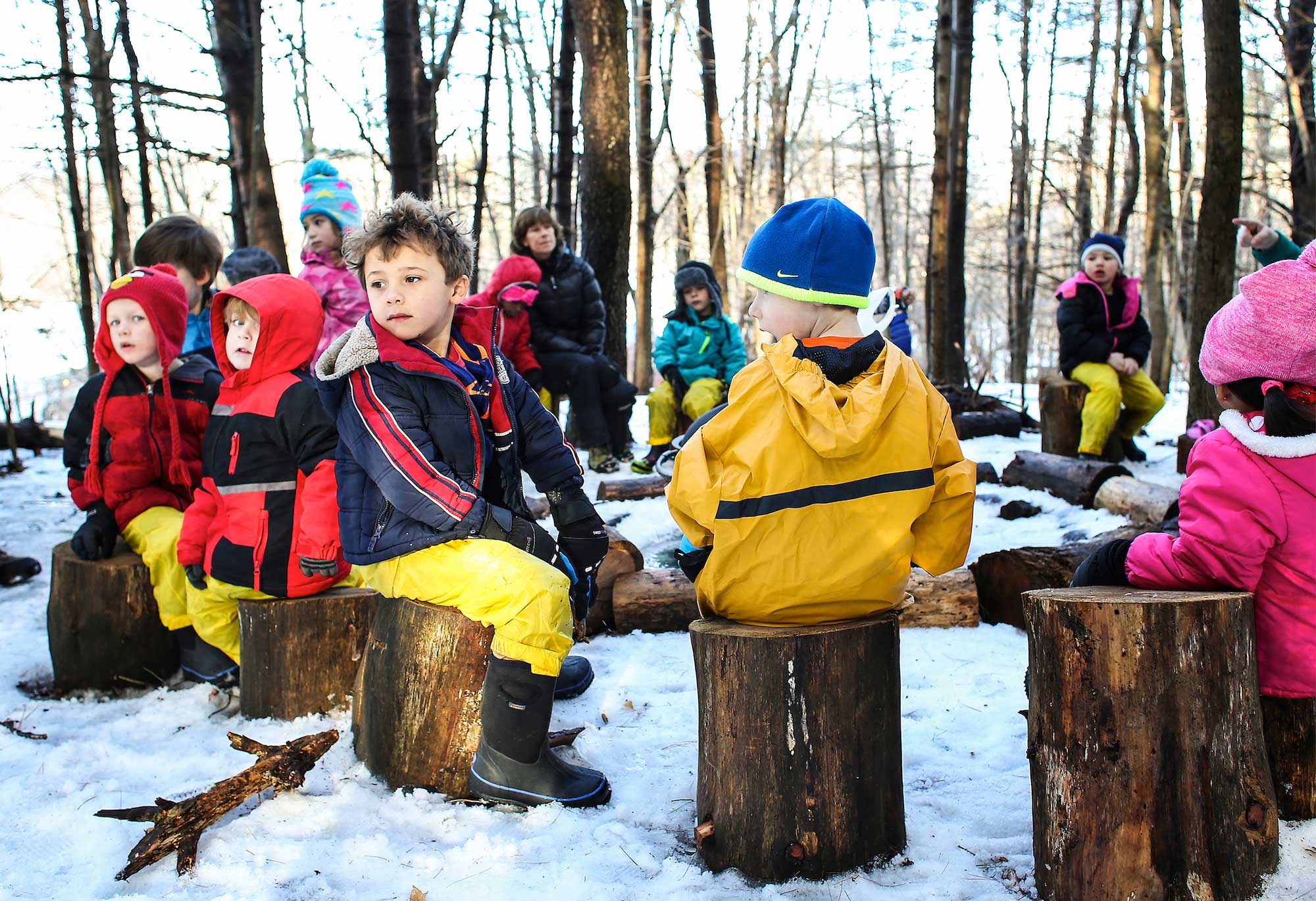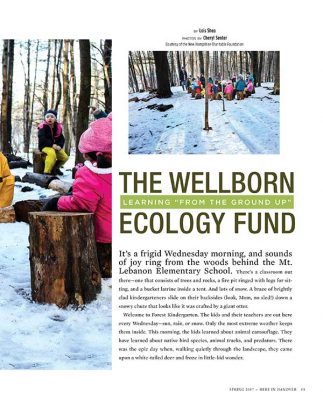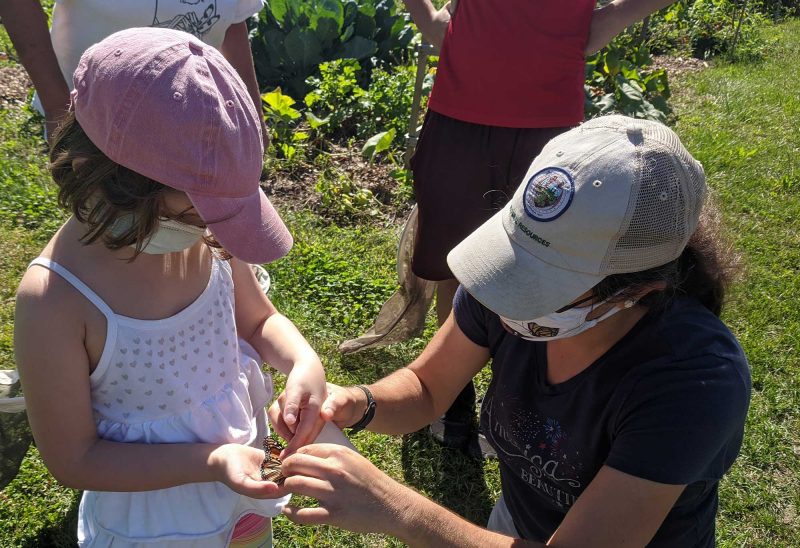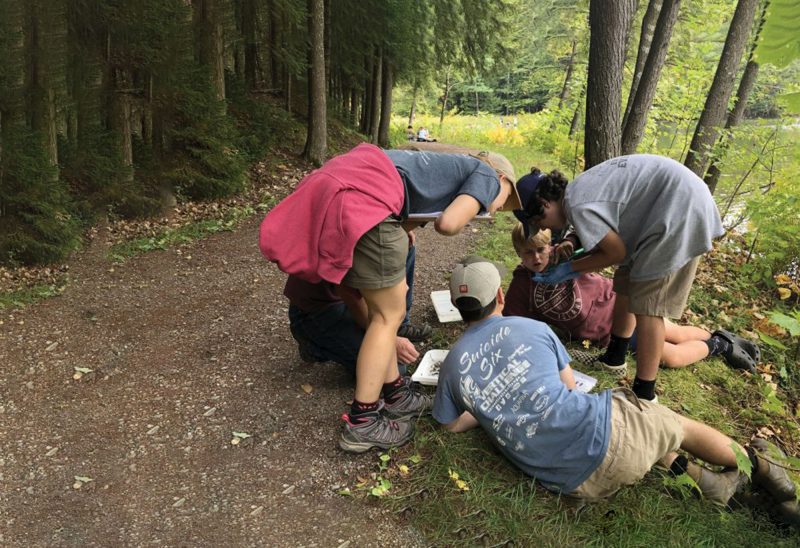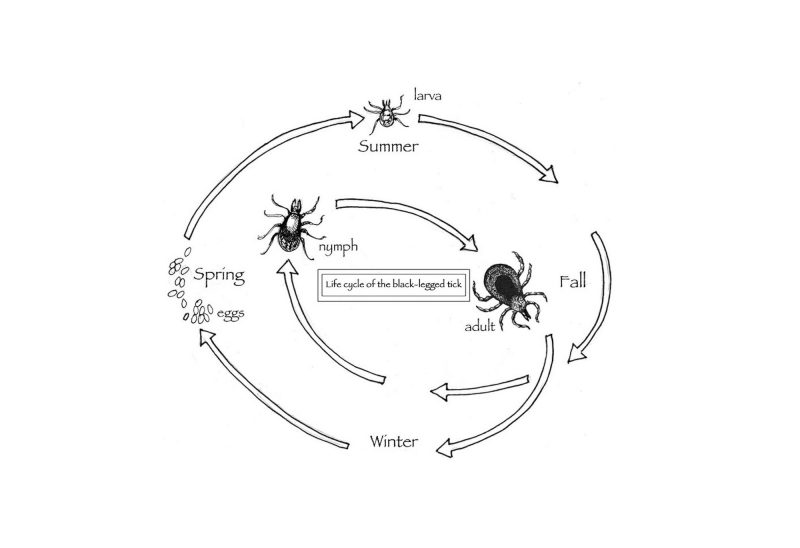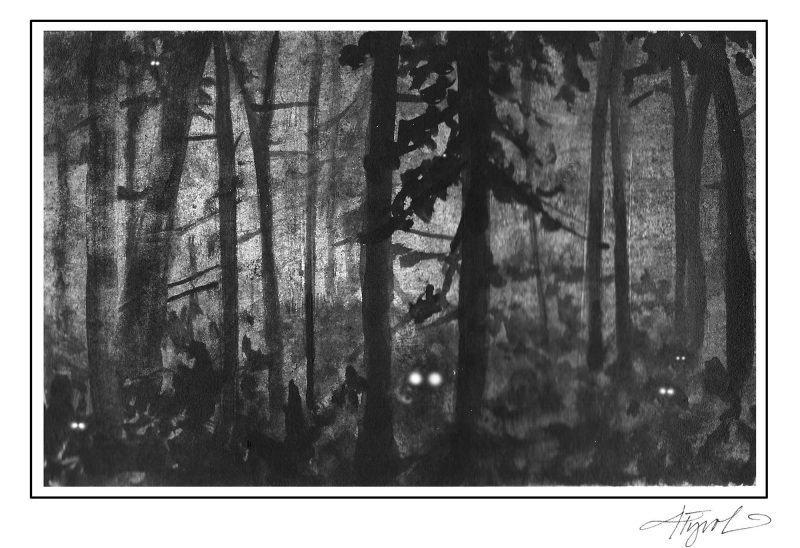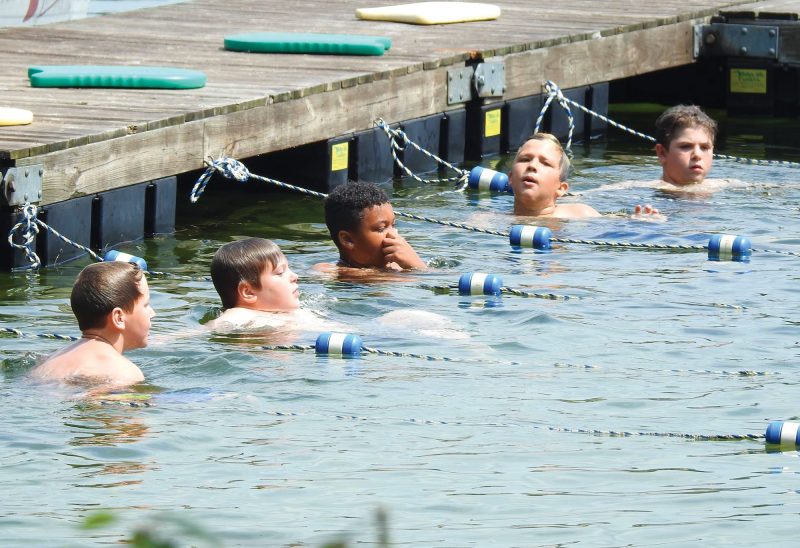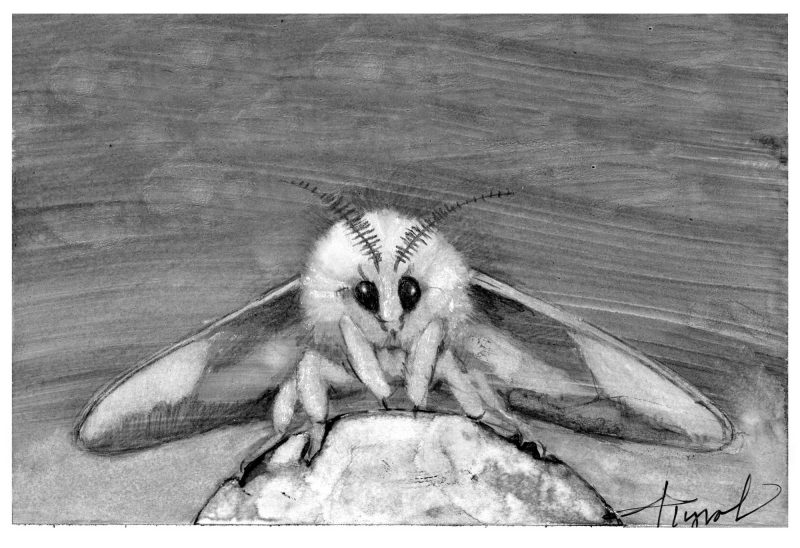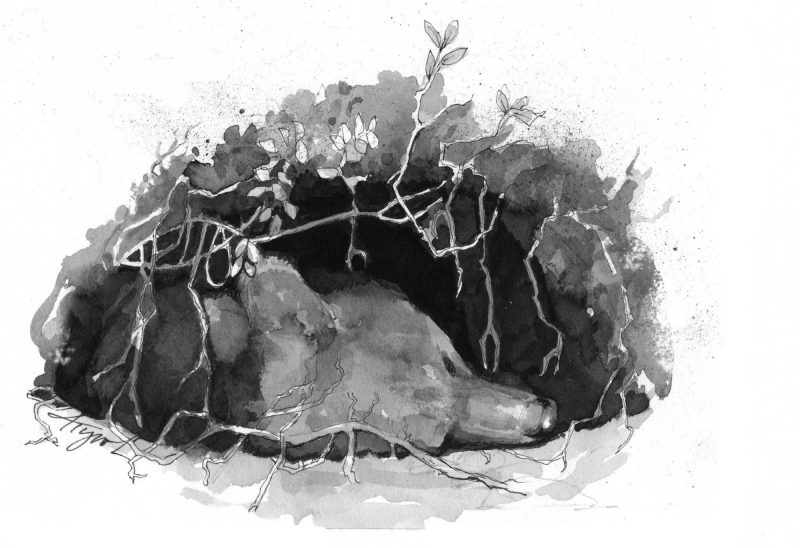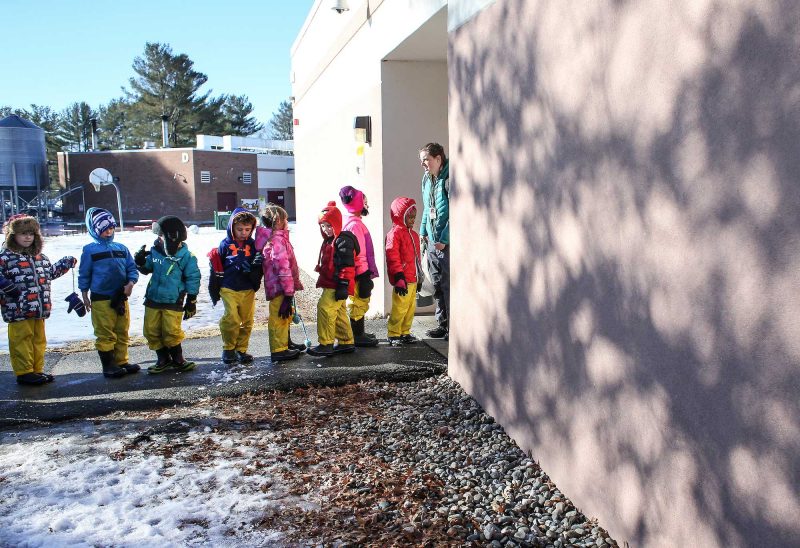This article first appeared in the Spring, 2017 issue of Here in Hanover magazine.
It’s a frigid Wednesday morning and sounds of joy ring from the woods behind the Mt. Lebanon Elementary School. There’s a classroom out there – one that consists of trees and rocks, a fire pit ringed with logs for sitting and a bucket latrine inside a tent. And lots of snow. A brace of brightly-clad kindergarteners slide on their backsides (look, mom, no sled!) down a snowy chute that looks like it was crafted by a giant otter.
Welcome to Forest Kindergarten. The kids and their teachers are out here every Wednesday, sun, rain or snow. Only the most extreme weather keeps them inside. This morning, the kids learned about animal camouflage. They have learned about native bird species, animal tracks and predators. There was the epic day when, walking quietly through the landscape, they came upon a white-tailed deer, and froze in little-kid wonder.
The concept of “Forest Kindergarten” was launched in the Upper Valley with help from the Wellborn Ecology Fund of the New Hampshire Charitable Foundation. It has taken hold in 20 schools in New Hampshire and Vermont, and gained national attention.
Marguerite Wellborn’s legacy
Such programs are just one example of the impact of the Wellborn Ecology Fund, which was created by a woman whose charitable legacy has touched hundreds of thousands of people.
Thanks in part to Marguerite Wellborn’s bequest, place-based ecology education has been incorporated into the curricula at dozens of schools across the Upper Valley — from kindergarten to high school.
“Kids get out there and learn to love their place and get their fingers dirty…and learn to become good stewards of their place,” said Sheila Moran, a longtime Upper Valley school principal and former Wellborn Ecology Fund advisory committee member.
Since 2001, the Wellborn Ecology Fund has awarded grants totaling more than $5.5 million to more than 125 organizations and programs in the Upper Valley, and is positioned to continue in perpetuity.
Students are tracking wildlife, studying vernal pools and stream ecology, learning about carbon sequestration, measuring climate—and much more. The Wellborn Institute, launched in 2014, provides educators with professional development and resources. Farm-to-school projects are teaching kids about local farms, local food production and good nutrition. “The Outside Story,” a weekly essay series (also bound in two compilation volumes), appears in Northern Woodlands magazine and in local newspapers, exposing more than 190,000 readers to weekly articles on ecology—from the return of the Karner blue butterfly to the science of bird migration, from the way raccoons prepare for winter to how snakes use their tongues to help them smell.
“Nature-based education should be a New Hampshire or Vermont child’s birthright,” said David Sobel, a senior education department faculty member at Antioch University New England and national expert on place-based education. “The Wellborn Fund has helped to normalize the whole notion of place-based education…that this is normal and correct and what’s healthy for kids.”
A passion becomes a legacy
Margurite Wellborn was a devoted and self-taught naturalist. The outdoors were her playground, her laboratory and her home. She studied ecology her entire life, reading voraciously between forays out-of-doors, and shared what she learned with her children and grandchildren, taking them on nature walks to identify local flora and fauna. She wrote articles about the construction of spider webs and the complicated lives of ants, about roses and skunk cabbages and climate change. She was profoundly worried about the fate of the environment.
Wellborn lived her last six years in Hanover, and developed a strong connection with the Upper Valley landscape. Her daughter, Sally Wellborn of Cornish, remembers her saying “’you have such clean air here!’” Not long before she died, she said to Sally: “I can’t believe what’s happening to the world.”
In Marguerite Wellborn’s will were her last 70 words on the subject, calling for the creation of the Wellborn Ecology Fund at the New Hampshire Charitable Foundation “to be used for public awareness of environmental and ecological issues in the Upper Valley…” She left nearly $10 million to help preserve the environment she loved so well by helping people to understand it.
“She noticed that we were using up our beautiful environment and she was worried,” Sally Wellborn said. “She was so worried that she gave that bequest to everybody.”
The Foundation put Kevin Peterson — a Dartmouth alum, former Appalachian Trail manager and current Lyme town moderator — in charge of overseeing the fund. Peterson (who also oversees the Foundation’s environmental grant-making portfolio) has made carrying out Marguerite Wellborn’s legacy a central part of his life’s work.
“It’s an honor for the Charitable Foundation to steward Mrs. Wellborn’s legacy,” said Peterson. “Understanding and being connected to our places in a visceral way, by learning outdoors, is critical to community well-being and to the continued stewardship of our spectacular natural resources.”
Peterson thinks Marguerite Wellborn would have reminded him of his own mother – a self-taught naturalist, nature-center docent and outdoor enthusiast. “This kind of work is in my DNA,” Peterson said. “I care deeply about its success.”
Wellborn’s bequest came just ahead of what has become a mounting body of evidence about the value of place-based environmental education and outdoor exploration. The Wellborn Ecology Fund helped keep the Upper Valley ahead of the curve.
“I think it becomes more relevant every day,” Sally Wellborn said. “They’re learning from the ground up, so to speak. And this notion of ‘place-based education’ — the whole fund has taken this to heart, and helped connect people with their backyards and with the outdoors.”
In Lebanon, the forest kindergarteners gather back around their fire. Mittens are laid to dry, little cheeks glow red, eyes are bright. (Their feet are warm and dry — a grant from the Wellborn Fund bought all of their boots from the local feed store, plus other outdoor gear.) When they go inside, they will write and draw about their experiences in the woods. Their teacher, Christina Joanis, says that when they write and draw after being outdoors, they do so with unrestrained enthusiasm. They are motivated to spell new words, to find new and vivid ways to express themselves.
Joanis said some of the kids were struggling with full-day kindergarten. But at a recent parent-teacher night, parents of the Forest Kindergarteners affirmed that the program was helping turn that around. “Every parent said ‘my kid loves to go to school.’”
Around the fire, the children share thoughts: “I liked playing camouflage.” “I liked when I helped with the fire, getting some sticks.” “I liked when I was going sliding…”
They sing a song as they get ready to head inside. It ends like this:
“We like the forest, we like the forest, bye, bye, bye…”
Learn more about how the Wellborn Ecology Fund is increasing environmental and ecological science knowledge in the Upper Valley. A recent report shows that Wellborn-funded programs are having a positive effect on educators. Read the executive summary and full report.
For additional photos and to view the article as it appears in Here in Hanover magazine, please click the image below.

